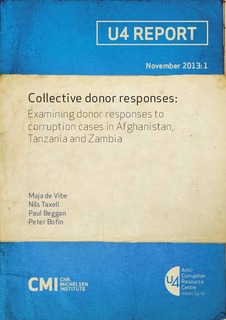Collective donor responses: Examining donor responses to corruption cases in Afghanistan, Tanzania and Zambia
Research report
Permanent lenke
http://hdl.handle.net/11250/2474868Utgivelsesdato
2013-11-04Metadata
Vis full innførselSamlinger
- Publications [1488]
Originalversjon
Bergen: Chr. Michelsen Institute (U4 Report 2013:1) 98 p.Sammendrag
In 2006, the OECD Development Assistance Committee (DAC) Ministers of Development expressed a desire to move towards more effective collective responses to corruption. A policy and follow up reports were developed, and Uganda was the first country where the new ideas were put into practice. This report, which includes a study of cases from Afghanistan, Tanzania and Zambia, contributes to expanding the understanding of development partner responses to concrete corruption incidents. The reports seeks to explore the factors that influence the extent to which donors are able to act collectively as a joint, credible enforcer of anti-corruption policies in response to concrete cases. As a backdrop to the case studies, a literature review was conducted, with a focus on what drives change with regards to corruption—and whether there is a role for development partners in effectuating or supporting such change. It also looks at what the literature says about the key factors that influence the response of development partners to corruption cases.
Utgiver
Chr. Michelsen InstituteSerie
U4 Report 2013:1Beslektede innførsler
Viser innførsler beslektet ved tittel, forfatter og emneord.
-
Large-scale mining in protected areas made possible through corruption: Options for donors
Beevers, Michael D. (U4 Brief 2015:7, Report, 2015-06-18)Large-scale mining of minerals and metals are threatening protected areas, and corruption is often to blame. International donors must engage with governments, mining companies and local stakeholders to encourage transparency ... -
Collective donor responses: Barking or biting?
de Vibe, Maja; Taxell, Nils (U4 Brief 2014:4, Report, 2014-03-25)In 2006, the OECD Development Assistance Committee Ministers of Development expressed a desire to move towards more effective collective responses to corruption. However, donors have continued to struggle with responding ... -
The role of donors in the recovery of stolen assets
Zinkernagel, Gretta Fenner; Pereira, Pedro Gomes; De Simone, Francesco (U4 Issue 2014:8, Research report, 2014-01-01)Financial crimes such as corruption, fraud, and embezzlement generate significant profits, often at the expense of the public budget. These proceeds of crime are usually hidden outside of the country where the crime was ...
